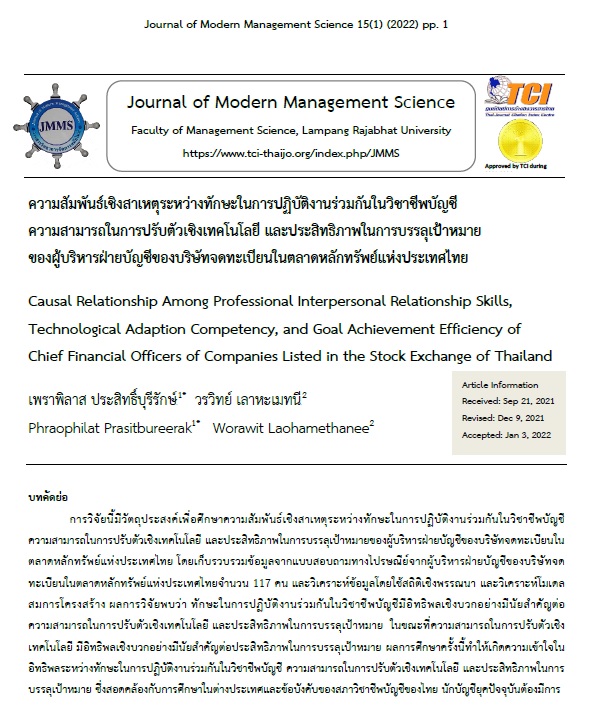Causal Relationship Among Professional Interpersonal Relationship Skills, Technological Adaption Competency, and Goal Achievement Efficiency of Chief Financial Officers of Companies Listed in the Stock Exchange of Thailand
Main Article Content
Abstract
The objective of this research is to investigate the causal relationship among professional interpersonal relationship skills, technological adaptation competency, and goal achievement efficiency of chief financial officers of companies listed in the Stock Exchange of Thailand. The data were collected by questionnaires sent via postal mail from 117 chief financial officers of companies listed in the Stock Exchange of Thailand. They were then analyzed by descriptive statistics and structural equation modeling. The research results reveal that professional interpersonal relationship skill has a significant positive influence on technological adaptation competency and goal achievement efficiency. In addition, technological adaptation competency has a significant positive influence on goal achievement efficiency. These research results help enable a better understanding of the causal relationship among professional interpersonal relationship skills, technological adaptation competency, and goal achievement efficiency of chief financial officers of companies listed in the Stock Exchange of Thailand. Moreover, these results confirm the empirical consensus between academic research and professional standards of the Thai Federation of Accounting Profession. They may also provide guidelines for the development of an accounting study program that promotes proper education and professional skills for professional accountants in the future.
Article Details

This work is licensed under a Creative Commons Attribution-NonCommercial-NoDerivatives 4.0 International License.
The article must be considered and accepted for publication by the editorial board of the Faculty of Management Science, Lampang Rajabhat University. The articles have been reviewed by a peer (peer review) and the author must update according to the suggestion if available before publication. Articles that are not considered the editorial team will inform the results of the consideration but will not send the original to the author.
JMMS is the Faculty of Management Science journal, Lampang Rajabhat University. Jmms published both print and online editions. We allow the use of articles for academic use under the scope of copyright law.
References
กนกอร อรุณทวีรุ่งโรจน์. (2560). ประสิทธิภาพการปฏิบัติงานและความสำเร็จในวิชาชีพบัญชี กรณีศึกษา : นักบัญชีในบริษัทจดทะเบียนในตลาดหลักทรัพย์แห่งประเทศไทย. วิทยานิพนธ์ปริญญาบริหารธุรกิจมหาบัณฑิต, มหาวิทยาลัยเทคโนโลยีราชมงคลพระนคร.
ตลาดหลักทรัพย์แห่งประเทศไทย. (2563). รายชื่อบริษัทจดทะเบียนในตลาดหลักทรัพย์แห่งประเทศไทย. [ออนไลน์]สืบค้นเมื่อ 10 มิถุนายน 2563 เข้าถึงจาก https://www.set.or.th/set/marketstatistics.do
นันทวรรณ บุญช่วย. (2563). ยุคพลิกผันทางเทคโนโลยีกับการพัฒนานักบัญชีนวัตกร. วารสารบริหารธุรกิจและสังคมศาสตร์ มหาวิทยาลัยรามคำแหง, 3(1), 15-26.
นภารัตน์ ศรีวรรณวิทย์. (2564). Upskill และ Reskill ความท้าทายสำหรับ CFO และผู้ประกอบวิชาชีพบัญชีในโลกที่เปลี่ยนแปลงอย่างรวดเร็ว. [ออนไลน์] สืบค้นเมื่อ 22 มิถุนายน 2564 เข้าถึงจาก https://www.tfac.or.th/Article/Detail/135090
ปัญจพร ศรีชนาพันธ์, ณัฐนรี ทองดีพันธ์ และสิงหา คำมูลตา. (2561). ผลกระทบของศักยภาพของนักบัญชีที่มีต่อความสำเร็จในการปฏิบัติงานของธุรกิจอุตสาหกรรมในจังหวัดลำปาง. วารสารวิทยาการจัดการสมัยใหม่, 11 (2), 58-70.
สภาวิชาชีพบัญชีในพระบรมราชูปถัมภ์. (2557). มาตรฐานการศึกษาระหว่างประเทศสำหรับผู้ประกอบวิชาชีพบัญชี. [ออนไลน์] สืบค้นเมื่อ 16 มิถุนายน 2563 เข้าถึงจาก http://www.fap.or.th/st_eduit.php.
สมชาติ กิจยรรยง. (2536). สรางบริการสรางความประทับใจ. กรุงเทพฯ: เดช - เอน การพิมพ.
อนุุชา ถาพยอม, บงกช ตั้ังจิิระศิิลป์์ และวรพรรณ รัตนทรงธรรม. (2563). ผลกระทบของความสามารถในการปรับตัวต่อการตัดสินใจทางการบัญชีและผลการปฏิบัติงานด้านบัญชี: หลักฐานเชิงประจักษ์จากนักบัญชีในจังหวัดระยอง. วารสารสภาวิชาชีพบัญชี, 2(4), 15-29.
Aaker, D. A., Kumar, V., & Day, G. S. (2001). Marketing Research. 7th ed. New York: Wiley.
Armstrong, J. S., and Overton, T. S. (1977). Estimating Non-response Bias in Mail Surveys. Journal of Marketing Research, 14(3), 396-402.
Bagozzi, R. P., & Yi, Y. (1988). On the evaluation of structural equation models. Journal of the Academy of Marketing Science, 16, 74-94.
Bar-On, R. (2006). The Bar-On model of emotional-social intelligence (ESI). Psicothema, 18, 13-25.
Byrne, B. M. (1998). Structural Equation Modeling with Lisrel, Prelis, and Simplis: Basic Concepts, Applications, and Programming. 1th ed. New York: Psychology Press,
DiMaggio, P. J. & Powell W. W. (1983). The Iron Cage Revisited: Institutional Isomorphism and Collective Rationality in Organizational Fields, American Sociological Review, 48(2), 147-160.
Guan, L, R., Don, H., & M. M, Mowen. (2006). Cost Management. 6thed. South-Western:Sout-Western CengageLearing.
Hair, J.F., Black, W.C., Babin, B.J., & Anderson, R.E. (2010). Multivariate Data Analysis. 7th ed, Upper Saddle River, New Jersey: Pearson.
Husted, B.W., & Allen, D.B. (2007). Corporate Social Strategy in Multinational Enterprises: Antecedents and Value Creation. Journal of Business Ethics, 74(4), 345–361.
Kermis, G., & Kermis, M. (2010). Professional presence and soft skills: A role for accounting education. Journal of Instructional Pedagogies, 2, 1-10. Retrieved from https://files.eric.ed.gov/fulltext/EJ1056346.pdf
Kline, P. (2000). A Handbook of Psychological Testing. 2nd ed. London: Routledge.
Meyer, J., W., & Rowan B. (1977). Institutionalized Organizations: Formal Structure as Myth and Ceremony. American Journal of Sociology, 83(2),340-363. Retrieved from http://www.jstor.org/stable/2778293
Nelson, M. W. (2009). A Model and Literature Review of Professional Skepticism in Auditing. Auditing. A Journal of Practice & Theory, 28(2), 1-34.
Nunnally, C.J, & Bernstein, H.I. (1994). Psychometric Theory. New York, NY: McGraw-Hill.
Perks, J., & Bar-On, R. (2010). Coaching for Emotionally Intelligent Leadership. In J. Passmore (2nd Ed.), Coaching for leadership. London, UK: Kogan Page, 55-74.
Phornlaphatrachakorn, K. & Na Kakalasindhu, K. (2021). Digital Accounting, Financial Reporting Quality and Digital Transformation: Evidence from Thai Listed Firms. Journal of Asian Finance, Economics and Business, 8(8), 409–419.
Pishghadam, R. (2009). A Quantitative Analysis of the Relationship between Emotional Intelligence and Foreign Language Learning. Electronic Journal of Foreign Language Teaching. 6(1), 31–41. Retrieved from https://e-flt.nus.edu.sg/wp-content/uploads/2020/09/v6n12009/pishghadam.pdf
Pulakos, E. D., Arad, S., Donovan, M. A., & Plamondon, K. E. (2000). Adaptability in the workplace: Development of a taxonomy of adaptive performance. Journal of Applied Psychology, 85: 612–624. DOI: 10.1037/0021-9010.85.4.612.
Vera‐Mun˜oz, S.C., Ho, J.L., & Chow, C.W. (2006). Enhancing Knowledge Sharing in Public Accounting Firms. Accounting Horizons, 20 (2): 133–155.
Thapayom, A., Ussahawanitchakit, P., & Boonlua, S. (2018). Effect of Emotional Intelligence Orientation on Audit Sustainability of Certified Public Accountants (CPAs) in Thailand. Journal of Accountancy and Management, 10(3), 1-16.
Watts, R. L., & Zimmerman, J. L. (1983). Agency problems, auditing, and the theory of the firm: Some evidence. Journal of Law and Economics, 613-633.
World Economic Forum. (2020). The Future of Jobs Report 2020. Retrieved From http://www3.weforum.org/ docs/WEF_Future_of_Jobs_2020.pdf


